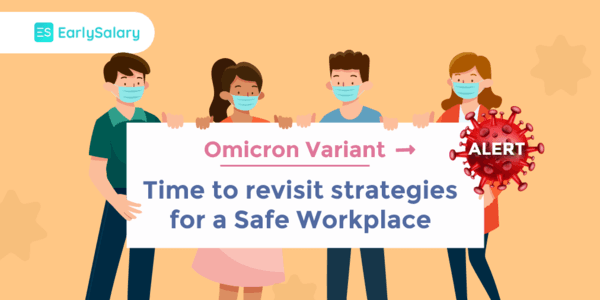
Highlight: With an increase in the cases of COVID-19 Omicron Variant, it is ideal to revisit strategies for a safe workplace ahead of the fear of another wave of the pandemic.
The WHO has reported a new potentially dangerous COVID variant called Omicron. Also known as B.1.1.529, its first case was detected in southern Africa in November of 2021 and is now seeing a steady rise in several nations worldwide. The World Health Organization further revealed that this coronavirus variant is spreading faster in nations with high population immunity levels.
With the rise in cases and uncertainty around its impact, restrictions, including travel restrictions, are being out in place, employers are being forced to reconsider the strategies for a safe workplace.
Vaccination continues to be the most effective weapon to prevent the risks of serious illness, hospitalization, or death caused by the coronavirus. Employers realize that the best way to ensure employee safety is to encourage vaccination. Encouraging employees to get vaccinated, offering time off for the same, or even offering on-site vaccinations are some strategies employers can adopt for a safer workplace.
As the rise of omicron variant cases doesn’t appear to be stopping anytime soon, it would be advisable for employers to incorporate COVID testing as a part of workplace policies. Testing can increase the detection of the virus considerably, allowing employers to take necessary precautions and prevent employees from coming to the workplace and spreading the virus.
Most companies have started or plan to shift remote employees back to the workplace. However, with the onslaught of omicron variant cases, it is necessary for employers to go back and think about it. Companies like Google and Ford Motors had planned on a complete transition of employees to working in-office but have put a hold on their plans until more information about the severity and transmissibility of the variant can be gathered.
The broader effects on the community should be considered because as more employees start returning to the workplace, the community transmission would also increase. They would use public transport, come in contact with more people, and even risk infecting the people they live with at the end of the day. However, companies could mitigate this risk by postponing employees’ return or adopting hybrid strategies for a safe workplace with flexible schedules and remote work.
Since the risk of workplace transmission is directly linked to the community infection rate, employers planning forward should consider these broader community effects.
Until a strategy for universal vaccination is devised, one of the essential strategies for a safe workplace would be to follow non-pharmaceutical measures to battle the omicron variant. Even before the development of vaccines for the virus, the standard operating procedure was to maintain social distance and mask. These should be practiced vigorously as the threat of the new variant hangs overhead.
Flexible schedules and remote work are adequate measures to practice social distancing. Many employers have gradually begun transitioning remote employees back to the workspace. In such cases, employees should be instructed to wear well-fitted masks and maintain a physical distance of 1 meter.
Employers could also enlist the help of financial incentives to promote social distancing. If social distancing is unfeasible, then large office gatherings at the very least should be limited.
The pandemic has changed workplace operations and policies. It not only increases the workload but also increases additional stressors.
Due to remote work through the pandemic, work-life and personal boundaries have blurred. Mental and physical health are closely interconnected, and if employees are overworked, overstressed, and burnt out, their immune systems are compromised. It puts them at a greater risk of getting infected and falling sick, despite being vaccinated.
Employers should continue providing continual mental support to employees through mental health counselors, allowing them to decompress through regular talks, events, and flexibility in office schedules.
Also read: Work Culture Boosts Productivity And Health. Here’s How
As the world witnesses the Omicron variant cases rising steadily, employers are forced to rethink their plans to transition work from home to work in-office and revisit their strategies for a safe workplace for employees.
Download the personal loan app here, or simply log in to our website and be a part of the #OneSmallStep experience.